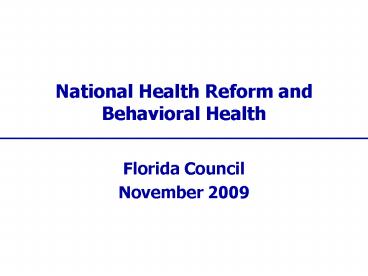National Health Reform and Behavioral Health PowerPoint PPT Presentation
1 / 15
Title: National Health Reform and Behavioral Health
1
National Health Reform and Behavioral Health
- Florida Council
- November 2009
2
A Comparison of U.S. House and Senate Health
Reform Bills
3
A Comparison of U.S. House and Senate Health
Reform Bills
4
A Comparison of U.S. House andSenate Health
Reform Bills
5
A Comparison of U.S. House andSenate Health
Reform Bills
6
A Comparison of U.S. House andSenate Health
Reform Bills
7
A Comparison of U.S. House andSenate Health
Reform Bills
8
A Comparison of U.S. House andSenate Health
Reform Bills
9
Behavioral Health Provisions in House Bill
- Requires all health plans participating in the
health insurance exchange to offer mental health
and substance abuse benefits, and require these
benefits to comply with the Wellstone-Domenici
Mental Health Parity Act. - Adds institutions receiving funding through the
mental health and substance abuse block grant to
the list of facilities eligible for 340B discount
drug pricing. - Creates a new long-term care insurance program,
the Community Living Assistance Services and
Support (CLASS) program. - Clarifies that federal Medicaid law does not
prohibit states from covering therapeutic foster
care through Medicaid. - Creates a 75 million 3-year demonstration
project to test reimbursement of private
psychiatric hospitals for the stabilization of
emergency medical conditions. - Increases payment for primary care services in
Medicaid to parity with the payments for primary
care services in Medicare, with the extra cost to
be borne by the federal government. - Requires that states suspend, not terminate
Medicaid benefits for youths age 18 and younger
who are incarcerated in a public institution. - Requires the government to conduct outreach about
the health insurance exchange to specific
populations, including people with mental illness
and cognitive impairments. - Creates a definition and criteria for Federally
Qualified Behavioral Health Centers (FQBHCs)
10
Health Reform Assumptions
- Health Reform law will be adopted by Congress
- Medicaid will be greatly expanded
- Medicaid income eligibility limits will be
increased to 133 to 150 of the federal poverty
limit - Medicaid categorical restrictions will be
eliminated (childless couples, single adults) - Federal government pays 100 of state costs in
the first two years then pays 91 in subsequent
years - States will lose Medicaid stimulus funds
- DSH/UPL/LIP funds will be reduced or eliminated
- Benchmark benefit plan will be defined by the
federal government, but state sets coverage
limits within broader parity requirements - Continued state administration of Medicaid program
11
Floridas Uninsured
- A substantial portion of DCF non-Medicaid
eligibles will become Medicaid eligible or
qualify for coverage through insurance exchanges
with subsidies - DCF non-Medicaid eligibles will become eligible
for comprehensive physical health benefits
Source Kaiser Foundation
12
The Medicaid Population - FY 2013
13
Possible Scenarios
- DCF Retains All or Most Funding and Expands
Wraparound Services and Services to non-Medicaid
eligibles - DCF Funds Transferred to AHCA for State Match and
DCF MH/SA Programs Greatly Reduced or Eliminated - DCF Retains Some Funding for Supports
- Residual DCF Programs Part of Public Option
14
CMHA Response
- Expand Capacities/Infrastructure/Staffing
- Expand Coverage of Medicaid Reimbursable Services
- Develop/Partner with HMOs/PSNs
- Develop Alternative Managed Care Programs
- Develop Specialized Medicaid Programs
- Develop Public Option Programs
15
Effect of Health Reform on DCF Programs
DCF
AHCA-Medicaid
Enrollees
HMO/PSN
HMO/PSN
BHO

